War? What war? The Critic, 5 August 1914
Topic: Gen - St - SA
To read the edition of The Critic on the day following the declaration of war against Germany and Austria, one might have expected just a hint that there was a war on. For The Critic, it appears to have been a nasty intrusion best ignored. Indeed this is a policy assiduously pursued by this fine newspaper for the duration although on occasion, the newspaper did publish something when casualties were particularly noticeable.
THE CRITIC August 5. 1914. Page 6
VICEREGAL ENGAGEMENTS.
This afternoon His Excellency will visit the Islington workshops, and on Friday will inspect the cadets of the St. Peter's College. On Saturday, with Lady Galway, Sir Henry Will attend the reception ceremony to the British scientists, and will be at the Government welcome in the evening. Lady Galway will be present at the chamber music concert at the Elder Conservatorium, and on Thursday night a meeting of the Alliance Francaise at the May Club Rooms.
HIS MODESTY, SIR HENRY GALWAY.
His Excellency blends graceful satire with a splendid modesty. At the Chamber of Commerce luncheon the other day it was mentioned that his predecessor, Sir Day Bosanquet, had put into book form all his South Australian speeches. It was suggested that Sir Henry should do the same and certainly the suggestion was by no means a piece of diplomatic sincerity. His Excellency, referring to the matter in the course of another fine address said there was one thing he would promise the people of the State. It was this. He would never publish his speeches. We shall have to call the Governor. His Modesty.
DR. CUDMORE.
Back in South Australia again after seven months' important surgical experience in the old world, Dr. Cudmore, who also included America in his tour. He was accompanied by his wife and children, and they are all much benefited by the trip.
 ANOTHER LAWYER.
ANOTHER LAWYER.
Another lawyer and another Smith, has been added to the South Australian list. It is Mr. Frank Seymour Smith, and care will have to be taken to prevent confusion with the name of Mr. F. V. Smith, who, however may fall back upon a more prominent use of Villeneuve to overcome any embarrassment. It was the Villeneuve Smith who moved for the admission of the Seymour Smith to the bar, and gave him a good start by saying he had perseverance, energy, and determination. Those are three excellent qualities, but the stock-in-trade of the successful lawyer requires more than these. It might be called a diplomatic conscience and an alternative ability to see innocence or guilt on any side at any moment.
MR. E. BRITTEN JONES.
Advice has just been received the; Mr. E. Britten Jones, who was the Rhodes Scholar in 1912, has passed first class for his B.A. degree at Oxford, with honors in physiology. There were only three first class passes, and it is a fine compliment to Mr. Jones as well as to South Australia that he was one of them.
OFF TO OXFORD.
By Fridays mail steamer Mr. R. Bronner will sail to go into Balliol College, Oxford, as a senior student. He will begin his studies with the new Oxford term during the second week in October. Mr. Bronner's idea is to take a two years post graduate course in political science, economics, and philosophy and to secure an original research degree in literature.
THE COMING OF THE SCIENTISTS.
The first batch of the big British scientists’ party arrived by the steamer Ascanius on Monday morning. They had spent a few days in Western Australia, where a number of the distinguished visitors are remaining. The main contingent will reach Adelaide on Saturday next. At 5 o'clock that afternoon there will be a University graduation in the Adelaide Town Hall, and in the evening there will be an official reception. The scientists will be in Adelaide for some days, and will hold a portion of their meetings here. Those who came by the Ascanius on Saturday were the President, Professor W. Bateson, Professor A. D. Hall, Professor W. G. Duffield. Professor G. Forbes, and Messrs J. Hesketh and N. Jacobson.
UNFORTUNATE GUILLAUX
South Australians will always take a keen interest in Guillaux, whatever he does and wherever he goes. His dazzling flying performances on the Cheltenham Course and the thrilling sensationalism of his looping the loop even now produce a queer reeling down the spine when they are recalled. The accident which occurred to the wonderful French aviator in Sydney on Saturday afternoon will cause profound regret in this State. Death or some fearful injury, somehow, seems inevitable when people go flying - flying it might be said in the face of gravitation. Guillaux fell 100 feet, was badly injured himself, and his machine was smashed. What happened has not been disclosed at the time of writing, but Guillaux stated after the accident that "the whole thing was a blank to me after I got up." Spectators of the Frenchman's exploits in the air will sincerely sympathise with him in his personal injury and his severe loss. Aeroplanes cost money, and Guillaux's was one of the latest type.
ENGLISH JOURNALISTS.
Mr. and Mrs J. B. Robertson will eerier in South Australia by the mail steamer Orvieto from London on Saturday next. Mr. Robertson is one of the board of management if the Trades Press, Limited, proprietors of Australasian Hardware and Machinery, The Draper of Australasia, and The Chemist and Druggist of Australasia. He left Adelaide 10 years ago to take up the position in Melbourne as sub-editor of The Grocer, and then went to London for The Trades Press. Mrs. Robertson is editress of one of London's well-known magazines, and she intends to write her impressions of Australia.
THE DEAN.
The Dean has gone to Los Angeles to spend several months with his brother. The very rev. gentleman is accompanied by his daughter, and they expect to have a happy time sojourning in California.
COMING HOME.
Sir Josiah Symon. K.C. who has been on a brief trip to England, where he was hospitably entertained by members of the English bar and many public officials, sailed on Friday for South Australia. He is a passenger by the mail steamer Maloja, and he will be in Adelaide again during the first week in September.
ADELAIDE ELOCUTIONIST.
Although Mr. Edward Reeves, the Adelaide elocutionist, went to England mainly for health and rest, he has apparently found it impossible to keep away from "shop." Prior to leaving Adelaide he told "The Critic" that he intended to "fight shy" of recitals unless, of course, a particularly tempting offer should come along. Presumably it has for Mr. Reeves will begin a series in King George's Hall, London, in October. He should give his public a capital idea of the standard of Australian elocution.
AN AMERICAN SCIENTIST.
Professor Moore, an American visitor to the meeting of the British Association for the Advancement of Science, was a passenger to Adelaide by the Melbourne express on Saturday.
NEW MILITARY OFFICER.
Captain Jess, who has been appointed to the headquarters staff of the Defence Department in this State, and was recently married, arrived in Adelaide by the Melbourne express on Saturday.
THE LATE MR. H. C. FLETCHER.
Mr. T. A. Fletcher fourth son of the late Mr. H. C. Fletcher. died at his residence, Woodville, on Saturday. The deceased, who was 53, was associated with Fletcher's slip and shipbuilding yards at Birkenhead. In his younger days he was a great athlete, and played football for the Port Adelaide Club soon after its formation. Mr. Fletcher succumbed to a painful internal malady.
THE CHIEF.
The Chief Justice will be back in Adelaide during the present week and will take a prominent part in the official festivities associated with the visit of the British scientists. Sir Samuel writes with courageous cheerfulness about his recovery from a critical operation. He may preside at the University graduation at the Adelaide Town Hall on Saturday afternoon when distinguished members of the overseas party will be admitted to complimentary degrees. There will be a rousing reception for the Chief lushes when he makes his reappearance on a public platform. The report presented at the annual meeting of the South Australian Law Society, held on Friday evening, expressed gratitude of members of the society at the continued and rapid progress towards recovery of the Chief justice (Sir Samuel Way). The stages of the trying ordeal through which he had passed had been watched with grave anxiety and the profession trusted that His Honor's reward might he such a complete return to health and vigor that he might still further engage upon his already illustrious career in the high judicial office, the duties of which he had proved himself sty eminently qualified to fulfil.
Notes:1. Captain Jess - Carl Herman Jess, born 16 February 1884, was appointed an officer with the 4th Infantry Brigade Headquarters, 30 September 1914. He was married to Mary Jess, who resided at 'Montalto', Miller Street, North Fitzroy, Victoria. He retired from the army as a Brigadier General with the Service Number VP16098. His archival records are maintained in Melbourne.
2. Maurice Guillaux was an enigma. Click on the link to read his story on this blog.
Citation: War? What war? The Critic, 5 August 1914
Posted by Project Leader
at 9:18 AM EADT
Updated: Friday, 13 June 2008 6:35 PM EADT
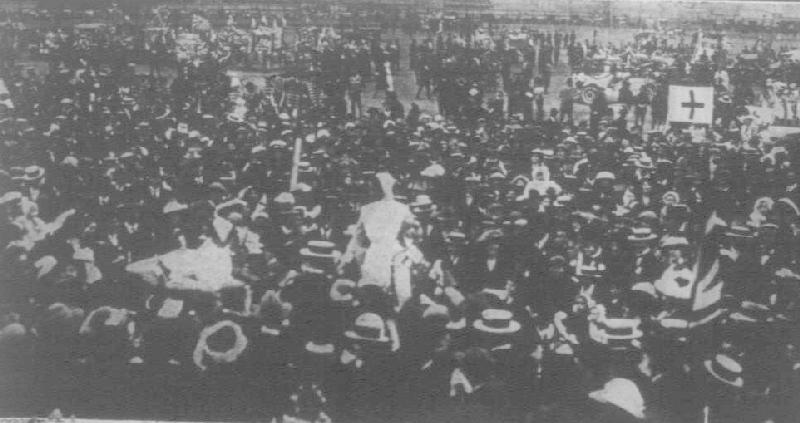




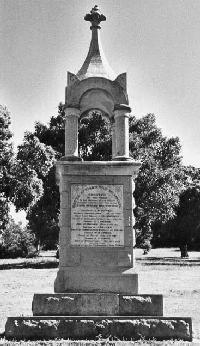
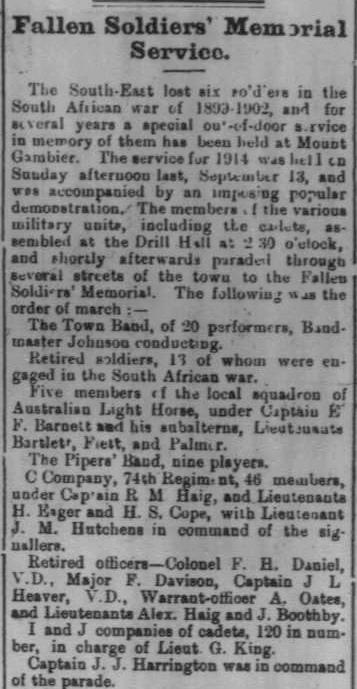
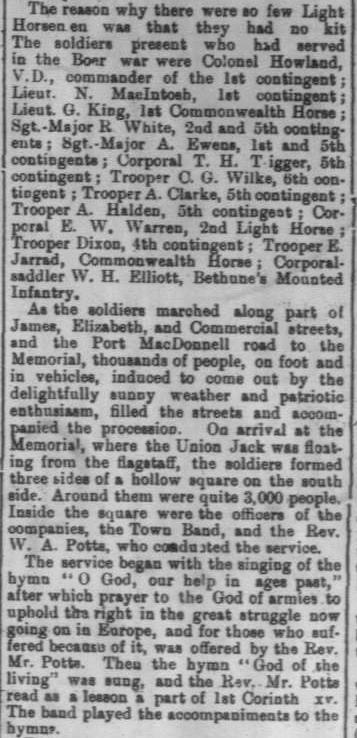
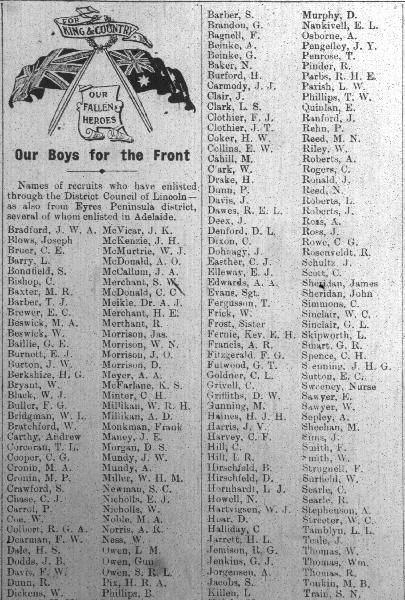
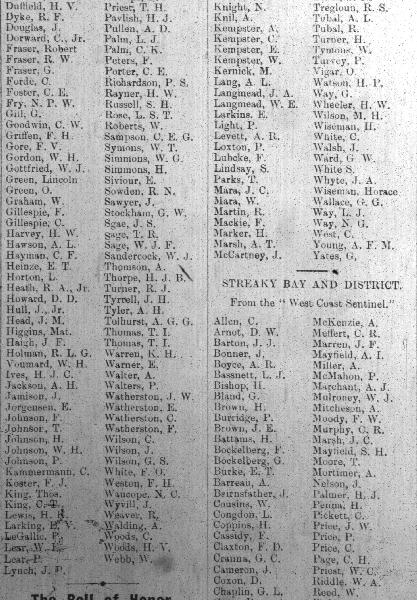
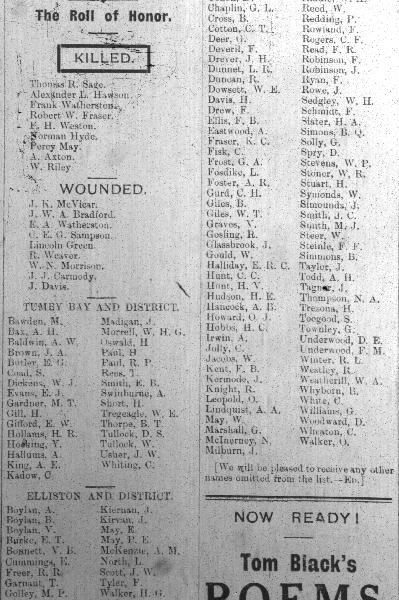
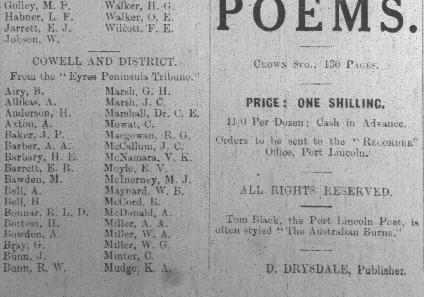
 ANOTHER LAWYER.
ANOTHER LAWYER.